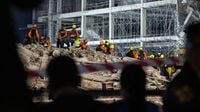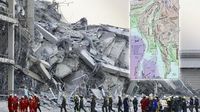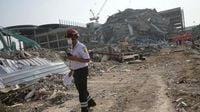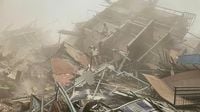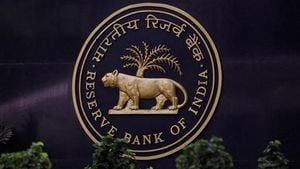A severe earthquake struck Southeast Asia on Friday, March 28, 2025, leading to devastating consequences, especially in Myanmar and Thailand. The earthquake registered a magnitude of 7.7, with its epicenter located near Mandalay, Myanmar. Reports indicate that over 140 people have died in Myanmar, and the military government has declared a state of emergency in six regions of the country.
In Bangkok, the tremors caused significant damage, including the collapse of a high-rise building under construction, which resulted in at least three deaths and left 81 people buried under the rubble. Eyewitness accounts describe a scene of chaos as people fled the streets in panic. "I was in a meeting when the building started shaking, and the ceilings collapsed," recounted Steffen Sinn, a regional director for Ziehl-Abegg, who experienced the earthquake firsthand in Bangkok.
The Thai government has issued warnings about potential aftershocks, with a magnitude 6.6 aftershock occurring just 20 minutes after the initial quake. Experts like Andreas Rietbrock, from the Karlsruhe Institute for Technology, have noted that aftershocks can occur for up to a year after a significant earthquake, posing risks to already damaged structures and emergency responders.
As the situation evolves, travel agencies have been proactive in ensuring the safety of their customers. Hotelplan has confirmed that all of its clients in the region are safe and advised them to follow local authorities' instructions. Muriel Wolf Landau, a spokesperson for Hotelplan, stated, "We are in close contact with our partners on the ground to provide important information to our customers." Meanwhile, Tourasia reported having 397 customers in Thailand and two in Myanmar, with few inquiries from those affected.
Despite the chaos, major airports in Thailand have confirmed that operations are running normally, with runways open and flights to Thailand proceeding without restrictions. Olivier Howald, a crisis manager at Kuoni, noted that regions like Phuket, Khao Lak, Krabi, and Koh Samui experienced minimal disruption and that most guests were able to return to their hotels or continue their travels.
However, the situation remains precarious in Myanmar, where the military junta has called for international assistance as reports of devastation continue to emerge. The Red Cross has highlighted the catastrophic impact of the earthquake, with significant damage to infrastructure, including several collapsed bridges and buildings. The power grid in Myanmar is partially out of service, complicating rescue efforts and information gathering.
Videos from Mandalay show a high-rise building collapsing within seconds, illustrating the earthquake's ferocity. The seismic activity in the region has drawn comparisons to the catastrophic earthquakes in Turkey in February 2023, emphasizing the geological risks faced by Southeast Asia due to its position along active tectonic plates.
Geoscientists explain that the region's vulnerability is primarily due to the shifting of the Indian and Eurasian tectonic plates, which collide and create stress along faults like the Sagaing Fault. Marc Szeglat, a geoscientist, noted that the ongoing tension in these plates could lead to further seismic events. "The region is like a seismic powder keg, and we fear that tensions along the 1,200-kilometer-long fault could release in the form of strong earthquakes in the near future," he said.
In light of these developments, travelers in the region are advised to stay informed about the situation and heed warnings from local authorities regarding potential aftershocks. The Thai government has temporarily declared a state of emergency in Bangkok, with Prime Minister Paetongtarn Shinawatra urging citizens to remain vigilant.
As rescue operations continue, the focus remains on locating those trapped under debris and providing assistance to the affected regions. The international community is closely monitoring the situation, with condolences pouring in from leaders around the world, including German Chancellor Olaf Scholz, who expressed his thoughts for the victims and their families.
The full extent of the earthquake's impact is still being assessed, but the immediate aftermath reveals a region grappling with both physical destruction and the emotional toll of such a catastrophic event. As authorities work to restore order and provide aid, the resilience of the affected communities will undoubtedly be put to the test in the days and weeks to come.

